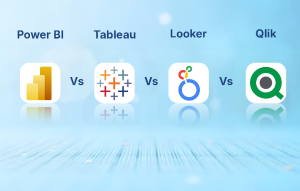The energy demand is expanding exponentially and will always continue to do so. Every industry requires energy in one or the other form. Hence, there is no control over it which makes it a matter of concern for the entire world.
The recent advancements have resulted in the generation of massive datasets in the energy industry and managing these datasets is the foremost concern faced by the companies in this sector. Thus, energy efficiency has become the new buzz in the energy sector. Several tools and technologies can help us to achieve the goal of energy efficiency like we can put more attention on efficient usage of electronic items, practice using solar power resources, etc.
Along with this, we must consider implementing a powerful analytics tool like Power BI which is a set of software services, apps and connectors that help in collecting and analyzing data to provide actionable insights.
With a smart Power BI solution in place, you get a Power BI energy consumption dashboard that helps you to:
- Analyze historical data on energy consumption
- Track and monitor energy usage
- Forecast risks and prevents failures
- Analyze energy generation and power outages
- Assist in solving the issues in real-time
Power BI implementation removes the complexities from the way energy organizations access data. It provides insights and enables you to deduce beneficial suggestions for action. With power BI in place, the data can be consolidated and you also get valid figures and clear analysis throughout your complete value chain.
Data360 Program = Customized Consulting + Services
Let’s take a look at some benefits of Power BI adoption for the energy sector:
Better information quality
Data analysis plays a very important role in decision-making. The lack of a proper system for data analysis leads to lower productivity, but the implementation of Power BI helps businesses with accurate data and useful insights which in turn support you in making appropriate decisions and achieving better results.
Well-organized Master Data Management (MDM)
Master Data Management (MDM) provides useful data about various important parameters like customers, vendors, products, etc. It becomes easy to maintain updated records of the company’s database with Power BI.
Enhances data governance
Determination of information quality and setting of standards depends upon data governance. Power BI in the energy sector makes sure that these processes are managed properly.
Enterprise-level data transparency
Data transparency helps to track any data from its source. It makes it easy to understand its evolution over the path. For energy companies, data transparency helps in maintaining regulatory compliances.
Challenges faced by the industry:
Due to constantly falling prices, it has become imperative to improve O&G process efficiency. Hence, operators have started investing in the best conventional technology at their disposal. For example, operators have succeeded to reverse the failing process efficiencies in the North Sea. They have also improved the average production rates.
The data analytics tool Microsoft Power BI helps you to:
- Analyze data efficiently
- Use existing solutions resourcefully without modifications
- Evaluate and analyze several resources easily
- Utilize advanced graphical user interfaces
- Empower your workforce to perform analysis independently
Advanced analytics can bridge the performance gap in Power BI
It is important to integrate Power BI solutions to increase the overall performance. These solutions are a combination of advanced engineering, data science and computing power that can simplify complicated production optimization problems. Power BI supports the traditional models and helps in bridging the performance gaps that affect production adversely. It includes advanced analytics which is powered by machine learning. It also uses statistical methods and computing power to recognize trends in several variables in continual conditions.
A few requisites for exploiting advanced analytics in Power BI:
Like every industry, the energy sector also needs the implementation of Power BI but to utilize it completely there are a few requirements, like:
1. Data accessibility– Data is the utmost requirement for advanced analytics in Power BI. The energy sector produces a huge amount of semi-structured data which they are not able to utilize completely and Power BI implementation does the job well.
2. Analytics infrastructure– Indeed, solutions customized for the energy sector are still evolving, but there is no shortage of technological offerings like Power BI that can help energy companies to enhance their processes and yield better profits.
3. Analytics skills– Companies in the energy industry need data scientists. They need resources to develop, implement and train people to use these solutions. Moreover, since it is a bit of new development for the energy sector, companies need to develop the skills to convert business issues into advanced analytics problems. Further, they need to convert analytics solutions into useful insights.
The final say
Power BI implementation increases real-time visibility and helps in minimizing operational variables throughout the value chain in the energy sector. A well-implemented Power BI helps companies in predictive analytics, optimizing investment, data-driven decisions and more. It also helps in improving the process components of reports, dashboards, data visualization and analytics, etc. Microsoft Power BI is a great analytics tool to analyze data and obtain insights. Also, you can monitor your business more closely and access the dashboards for Power BI reports for energy management. To know more about the implementation of Power BI in the energy sector, talk to our experts.









